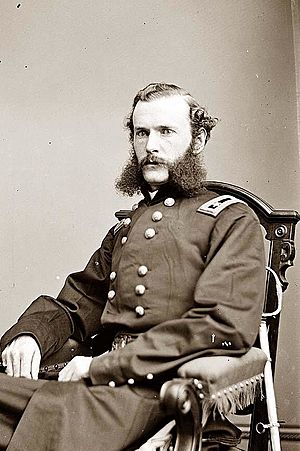Francis J. Herron facts for kids
Quick facts for kids
Francis Jay Herron
|
|
|---|---|
 |
|
| Born | February 17, 1837 Pittsburgh, Pennsylvania |
| Died | January 8, 1902 (aged 64) New York City |
| Place of burial |
Calvary Cemetery, Queens, New York
|
| Allegiance | United States of America Union |
| Service/ |
United States Army Union Army |
| Years of service | 1861–1865 |
| Rank | |
| Unit | |
| Commands held | Army of the Frontier XIII Corps |
| Battles/wars | American Civil War |
| Awards | Medal of Honor |
Francis Jay Herron (born February 17, 1837 – died January 8, 1902) was an important general for the Union Army during the American Civil War. He was known for his bravery and leadership.
Contents
Biography
Early Life and First Steps
Francis J. Herron went to the Western University of Pennsylvania. However, he left school at age sixteen. He then started working as a bank clerk.
In 1855, he moved to Dubuque, Iowa. There, he and his three brothers started their own bank. Herron also became interested in military service.
In 1859, he formed a local army group called the "Governor's Greys." He was chosen as their captain. In January 1861, he offered his company to President-elect Abraham Lincoln. This was before Lincoln officially became president.
Civil War Service
In April 1861, Herron became a captain in the 1st Iowa Volunteer Regiment. He served with General Nathaniel Lyon in Missouri. He fought in the battles of Boonville and Wilson's Creek.
In August, Herron was promoted to lieutenant colonel. He then joined the 9th Iowa Volunteer Regiment. He fought bravely in the battle of Pea Ridge. During this battle, he was wounded and captured.
However, he was soon exchanged for another soldier. For his actions at Pea Ridge, he became a brigadier general. Later, he received the Medal of Honor, a very high award for bravery.
Key Battles and Promotions
General Herron commanded two divisions of the Army of the Frontier. He led a very fast march of 114 miles (183 km) in just three days. This helped him join General James G. Blunt in Arkansas.
Herron and Blunt's combined forces fought against the Confederates at the battle of Prairie Grove. They forced the Confederates to leave western Arkansas. Because of his success at Prairie Grove, Herron was promoted again.
He became a major general of volunteers. At that time, he was the youngest major general in either the Union or Confederate armies.
His two divisions were combined into "Herron's Division." This division joined the XVII Corps. During the Siege of Vicksburg, Herron's division was on the far left side of the Union lines.
When Vicksburg surrendered, General Ulysses S. Grant chose Herron for a special honor. Herron, along with Generals James B. McPherson and John A. Logan, led the march into the city. They accepted the formal surrender of weapons on July 4, 1863.
Next, Herron led an expedition to Yazoo City. He captured the city, a Confederate fleet, and supplies there. Later, Herron was put in charge of the XIII Corps. He occupied the Texas coast, with his main office in Brownsville.
During this time, he helped Mexican President Benito Juárez. He also stopped French troops from settling along the Rio Grande. As the Civil War ended, Herron commanded the District of Northern Louisiana.
After the War
After the Civil War, Francis Herron stayed in Baton Rouge. He worked as a tax collector in New Orleans. He also served as a United States Marshal from 1867 to 1869.
He became the Secretary of State of Louisiana. In 1877, he moved to New York City. There, he worked as a lawyer and a banker.
Francis Herron died in New York City on January 8, 1902. He was buried in Calvary Cemetery in Queens, New York. He was a member of military groups like the Grand Army of the Republic.
Honors
A bronze statue of Herron was put up in January 1914. It was made by Solon Borglum. You can find it on Pemberton Avenue in Vicksburg National Military Park.
 | Audre Lorde |
 | John Berry Meachum |
 | Ferdinand Lee Barnett |

